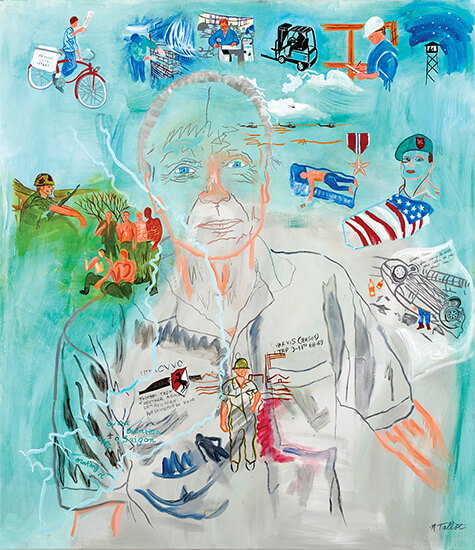
Veterans
Eugene Jarvis
Vietnam, U.S. Army, 11th Armored Cavalry Regiment Dates of service: 1967-69
"I'm a quiet activist within myself."
“Before I went into the service I was a hard worker. I started working at a very young age because I had to. I had nothing. I was always a person on my own. When I was eleven years old I was able to buy a $20 bike on a paper route. Vietnam was getting deep in '65-'66, and I felt it because I had a friend that was a Green Beret who got killed over there when a hand grenade blew up in front of him. He came home in a closed casket. It was in August of '67 when I went in.
“I was in was a small combat unit. My first day out in the field was in Bien Hoa. We had gone out to reinforce a medevac taking out the wounded during a firefight. While you’re out there, rounds are going over your head and you hear them bouncing off the APC treck. That's a situation you don’t want to be in. You can’t even think about wanting to be home, all you can think is just get me out of here, get me two blocks from here…What you thought about was protecting yourself and your buddy and hope that he was going to protect you too.
“Time down was when you thought about your family. At night if you were on guard duty sitting on top of the treck, looking out into the dead of night through the starlight scope you'd think about home. You look up at the stars and you're in a beautiful country. Overall it was just amazing how nice it was when it was quiet. Getting wounded is the ultimate of being in combat. It’s the only thing a soldier has to offer. A lot of guys came home: no legs, no arms or not at all. I didn’t get hit at all. I saw bullets around me and heard them around me but made it out unscathed. That's the biggest minus of being a Vietnam veteran. Why I came home I don't understand it. It's a guilt trip, constant. I joke around now like if I don’t hit the lottery or something I’ll say 'I guess my luck ran out in Vietnam.'
“You don’t realize until you come home the mental effect that war has, because you’re back in a world where this is not going to happen. But then you’re thinking about your friends that are still there and there’s a point in that period of time where you want to go back. Sounds crazy but you think 'I didn’t do enough. I should go back.' You get to a point where it dwells on you. It really hangs with you. It still does. Then you see guys that come home from the war who get killed. For what? Like Ken Simon, who became my first real good friend early in my tour. He died a month after he got home when his car flipped over and his neck was broken. I didn't get the letter until I came home and his sister wrote me to let me know because I kept writing letters and I didn't hear anything from him. I was devastated. He was real close to me, literally brother close. He was a good man.
“I had another friend who I was close with, Charles from Michigan, who died of an overdose of Thorazine after the war. He was having a very tough time adjusting. This was back in the early 80’s when post-traumatic stress disorder (PTSD) wasn't noted. He was doing drugs, and it got to a point where he became disoriented with his surroundings and the people he was with. He committed himself for two weeks and he signed himself out but while he was there they had him on Thorazine. They gave him the drug when he left the hospital without being monitored at home. I was out shopping for a gift for my wife when she called me and told me that his mother had called to say that he had passed away in his sleep. It was devastating too because I was supposed to meet him at the airport the following day.
“After coming home, things happened so quickly: I went back to my job as a forklift operator in the shipping department at Westinghouse. I took a test to become a machinist apprentice and did well enough to get that job. I was there a couple of months, but I couldn’t stand being in the building. It was a huge prison-like building and I was confined to the second floor. I had a very good boss, a Korean War vet named Dave Sutherland, and I told him I was leaving. He knew exactly why and he told me 'Look don’t worry about it. You want to leave you leave. You want to come back in a year, I’ll give you your job back - don’t worry about it.' It just so happened that a year later they laid off fifty percent of the workforce at Westinghouse so that job may not have been there anyway.”
He was interviewed by Mark Rand in Wyckoff, New Jersey on July 10, 2011.